Negotiators Clash Over a Wildlife Treaty
Representatives of more than 80 nations, meeting in Nairobi, Kenya, to negotiate a treaty to protect the world’s wildlife and its habitat, are clashing over language intended to spur conservation but denounced by the United States as an infringement of states’ rights.
The talks, which began Monday and will continue through next Wednesday, are aimed at producing a biological-diversity treaty that could be signed by world leaders at the Earth Summit in Rio de Janeiro next month.
Some environmental activists, citing an internal memorandum by Vice President Dan Quayle’s staff criticizing many of the proposed treaty’s provisions, have charged that the Bush Administration is trying to gut the document.
Among the potential stumbling blocks is language that would require signatory countries to regulate or manage biological resources, including plants and animals, for their conservation and sustainable use.
Washington has objected to the wording, contending that it would inadvertently switch jurisdiction for wildlife management from the states to the federal government.
“What we are trying to do is work out language . . . that makes clear that this is shared responsibility in this country,” said Curtis Bohlen, assistant secretary of state for oceans, the environment and science and a former senior vice president of the World Wildlife Fund.
“But in the process of trying to introduce language to do that, people have perceived it as an effort to weaken the convention,” Bohlen added. “I assure you that is not our intention.”
Another potential sticking point has been an effort by some countries to write a treaty that calls for strong environmental and health safeguards in the release of genetically engineered organisms.
U.S. negotiators have said the United States will not sign any treaty that includes measures that would further regulate the biotechnology industry, which uses genetic engineering in the making of items ranging from new drugs to agricultural products.
“But I think the chances are that (disagreements) can be worked out on that,” Bohlen said.
Kenton Miller, senior associate of the World Resources Institute, a Washington-based environmentalist think tank, said the treaty would be a “fundamental step forward” because it would require nations for the first time to be responsible for the conservation of their species and landscapes.
But in the Nairobi negotiations, the United States has been “systematically trying to weaken and remove obligations” from the text on instructions from Washington, Miller said in a telephone interview from Nairobi.
Sen. Albert Gore Jr. (D-Tenn.) gathered signatures Wednesday for a letter to President Bush asking for a treaty that stresses conservation of biological diversity. “I think that the Administration is intent on gutting the bio-diversity treaty, and I think the arguments which are being highlighted in their public statements are not their real concerns,” Gore said in a telephone interview from Washington.
“I think that they are worried about offending some parts of the biotech industry by leaving open in the convention a possibility for future regulation. . . . “
John Fitzgerald, who is monitoring the Nairobi talks for Defenders of Wildlife, an environmental group, agreed.
He said U.S. negotiators have consistently added such language as “as far as possible” or “as appropriate” to reduce the obligations of signatories. He complained that the United States also opposes language that would require countries to perform an environmental impact assessment of projects on the high seas or overseas.
More to Read
Start your day right
Sign up for Essential California for news, features and recommendations from the L.A. Times and beyond in your inbox six days a week.
You may occasionally receive promotional content from the Los Angeles Times.







